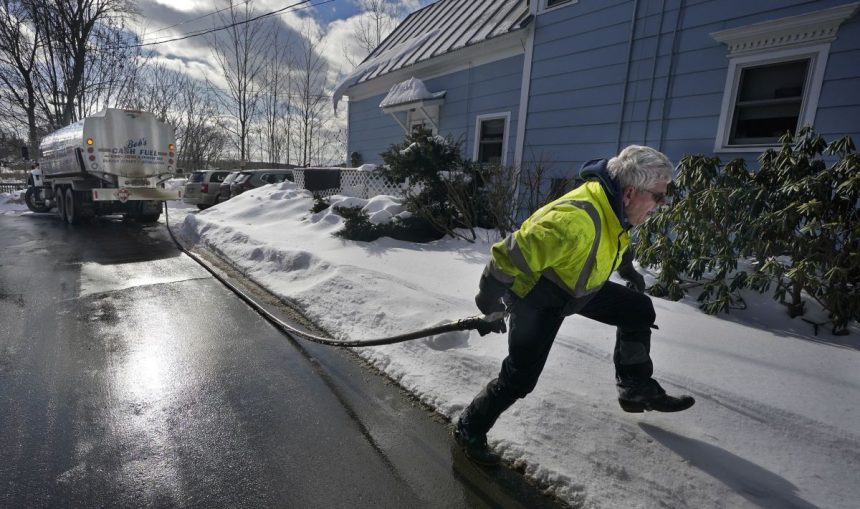This story appears as part of a collaboration between The Maine Monitor and Maine Focus, the investigative team of the Bangor Daily News, a partnership to strengthen investigative journalism in Maine. You can show your support for this effort with a donation to The Monitor. Read more about the partnership.
People in northern Maine calling for heating aid are being met by a staff member reading from a script meant to calm panicked and angry callers.
That’s because the federal government shutdown means no money will be released under a program that typically rolls out on Nov. 1.
Staff at the Aroostook County Action Program have been bombarded with calls from people expecting help heating their homes that will go unfunded if the prolonged shutdown continues.
“I have a great and considerable fear that people will freeze to death in their homes this winter if we do not turn this around quickly,” Jason Parent, ACAP’s CEO, said.
Temperatures are dropping below freezing at night across Maine. The looming trouble for federal heating aid programs could be the most acute effect of the shutdown here so far.
The Low Income Home Energy Assistance Program typically injects $40 million into the state and served nearly 44,000 people last year, with the largest concentrations in the northern counties.
Typically, the billions of dollars allocated to states by the federal government to fund the program are disbursed between mid-October to November. Emergency benefits become available on Nov. 1. The federal dollars are distributed to MaineHousing, but households apply through one of the state’s 10 community action agencies.
MaineHousing and those other agencies will continue to accept and process applications so that when the funding is restored, it can be delivered as quickly as possible, spokesperson Scott Thistle said. It will also continue to work on solutions with its partners.
“This is not a situation anybody wants to be in, and we share in the anxiety of all our partners and the people who need this assistance,” Thistle said.
The Aroostook organization, which also serves Hancock and Washington counties, has been conducting fundraising drives and accepting donations.
There are few alternatives to LIHEAP in Maine’s communities, something that Parent contrasted with the many food banks that have stepped up their efforts to help Mainers weather the food stamp funding pause.
“Our staff are getting bombarded with very disturbing calls from customers who do not know what they’re going to do,” Heidi Rackliffe, ACAP’s chief program officer, said. “We’re looking at a point where people are going to be not only hungry, but cold. Cold and hungry. And this just seems like the brink of it.”
Reopening the federal government would not fix the situation overnight. If the funding tap turned back on, LIHEAP money likely wouldn’t get to states until early December, Mark Wolfe, the executive director of the National Energy Assistance Directors Association, said.
That timeline could be even further delayed as President Donald Trump’s administration fired the staff of 25 people that ran the program within the U.S. Department of Health and Human Services that ran the program in April. That was part of mass layoffs at the department.
Maine is particularly vulnerable as more than 50 percent of the state’s homes are heated with fuel. Unlike with electricity, there is no ban in Maine on heating fuel providers discontinuing service due to nonpayment in the winter.
Gov. Janet Mills and Maine’s congressional delegation have been vocal about the November pause on payments under the Supplemental Assistance for Needy Families Program but have said less about heating aid.
The governor’s press secretary Ben Goodman said on Wednesday that Mills “is looking at all available options to help Maine people who rely on SNAP and other programs interrupted by the federal government shutdown and press for solutions in Washington. The governor continues to urge Republicans who control the U.S. House, the U.S. Senate, and the presidency to reopen the government and end this needless shutdown.”
A spokesperson for Sen. Susan Collins, R-Maine, the top Senate appropriator, noted that she is working to secure a $20 million LIHEAP funding increase. Her office did not comment on specific plans to restore the funding, but the senator called on Democrats to reopen the government in a statement.
“I continue to urge my colleagues to abandon this brinkmanship so we can end the harm to our constituents, which is only getting worse as the shutdown continues,” she said.
The office of Sen. Angus King, I-Maine, did not comment.
U.S. Rep. Chellie Pingree, a Democrat from the 1st District, criticized Trump’s firings and put the onus on the president and his fellow Republicans in the House to end the government shutdown, although Senate Democrats seeking health policy changes have withheld the votes necessary to pass Republican measures to reopen the government.
The only House Democrat to vote with Republicans on the shutdown, Rep. Jared Golden of the 2nd District, said in a statement that his team is in touch with advocates in Maine, and the solution is clear.
“Congress needs to do its job, reopen the government, and get heating assistance — not to mention SNAP funds and support for veterans, seniors, and small businesses — flowing again,” he said.









